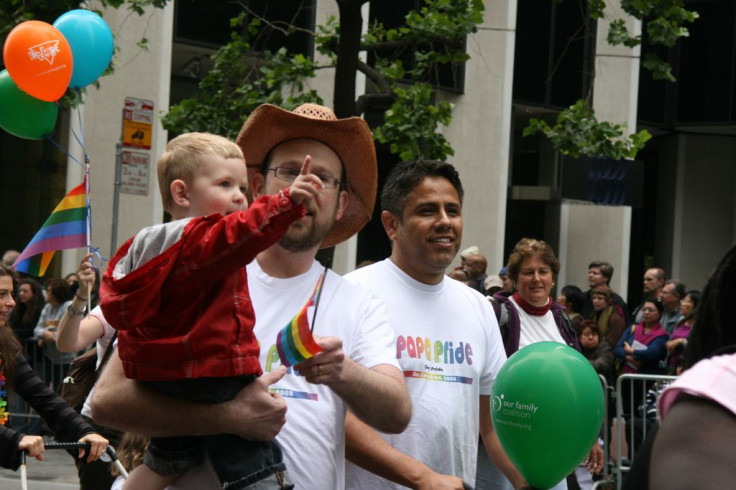Better Cooperation Among Parents More Important For Raising Kids Than Sexual Orientation

As conservatives continue to portray gay parenting as detrimental to kids' development, more scientific evidence supporting exactly the opposite is surfacing. A new study, published in the journal Child Development, suggests that for adoptive couples, the extent to which they work together and support each other is more important than their sexual orientation.
"It appears that while children are not affected by how parents divide childcare tasks, it definitely does matter how harmonious the parents' relationships are with each other," Rachel H. Farr, of the University of Massachusetts and lead author of the study, told the media.
Parents' Satisfaction With Each Other Makes The Difference
For the study, which found that gay and lesbian couples' parenting techniques differ from traditional gender roles, Farr looked at a total of 104 families. Twenty-five of them were headed by lesbian partners, 29 by gay male partners, and 50 by heterosexual partners. All of their children were adopted within the first few weeks of life, and the study took place when they were three years old.
The researchers had the parents tell them about the division of child labor tasks between them and on factors affecting their child's adjustment. They were also videotaped during parent-child play sessions, after which they were rated on scales for "supportive" and "undermining" interactions.
The results showed that lesbian and gay couples were better at sharing tasks equally, while the heterosexual couples were likely to specialize in a select few, with the mothers doing more of the work. The researchers also found that when it came to the videotaped interactions, "it was clear that other aspects of co-parenting, such as how supportive parents were of each other, or how much they competed, were connected with children's behavioral problems."
The children who showed the most behavioral problems were the ones whose parents were more dissatisfied with the division of child-care labor, rather than the actual division of the tasks.
"While actual division of childcare tasks such as feeding, dressing, and taking time to play with kids were unrelated to children's adjustment, it was the parents who were most satisfied with their arrangements with each other who had children with fewer behavioral problems, such as acting out or showing aggressive behavior."
Other Research and The State of Same-Sex Parenting in the U.S.
These findings echo previous research, yet many states still don't allow joint adoption for same-sex couples.
"Research has consistently found that what happens in the family, and how warm and involved the parents are in their children's lives, matters more than the gender and number of parents," Abbie Goldberg, a Clark University associate professor of psychology who researches same-sex parenting, told The Sacramento Bee.
An Australian study on over 500 children below the age of 18 with same-sex parents found that children grew up with the same amount of self-esteem and spent just as much family time with their parents as those who had heterosexual-parent couples.
Only 10 states currently allow joint adoption, including California, and only five other states allow for same-sex foster parents.
"The majority of states are silent on LGBT people fostering and adopting children," Emily Hecht-McGowan, public policy director for the Family Equality Council, which represents the interests of LGBT families, said. "Because there are no other laws either way what happens depends on where you go in the state. You get different answers. It's kind of a crapshoot."
The Sacramento adoption agency Sierra Forever Families actively seeks same-sex couples to adopt children.
"About 20 percent of our families come from LGBT community," Bob Herne, executive director of the agency, said. "People get very angry on either side of this issue, but our only politics is, every child should grow up in a forever family."
Source: Farr R, Patterson J. Coparenting Among Lesbian, Gay, and Heterosexual Couples: Associations With Adopted Children's Outcomes. Child Development. 2013.



























